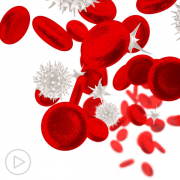Is My MPN Treatment Working?
Is My MPN Treatment Working? from Patient Empowerment Network on Vimeo.
During myeloproliferative neoplasm (MPN) treatment, specific blood tests and diagnostic measurements help to gauge a patient’s treatment response. Dr. Brady Stein details the criteria he assesses in monitoring the efficacy of a therapy, including patient-reported outcomes.
Dr. Brady Stein is a hematologist focusing on myeloproliferative neoplasms (MPNs) at the Robert H. Lurie Comprehensive Cancer Center of Northwestern University. Learn more about Dr. Stein, here.
Related Resources

|

|

|
Transcript:
Katherine:
Once a patient has started treatment, how do you know it’s working?
Dr. Stein:
That’s a good question because this is a very unique area. Yes, of course, in some respects, it’s straightforward with ET or PV. If we’re starting a medication to control a blood count in hopes of having lowered the thrombosis risk, you can look objectively at blood counts.
Okay, your hematocrit is at this goal? Yes, therapy’s working. You have not had a blood clot?
Yes, therapy’s working. So, there are some objective things. In myelofibrosis, there are some objective things like measuring the spleen and seeing it reduce. You can feel that with your hands, or you can do an ultrasound. So, there are some objective parameters of success. But, in this area, patient-reported outcomes are really important, and so, a measure of success is really just asking the patient, “Do you feel like your drug is working? Do you feel better?
It’s kind of a simple question, but it’s really important, and it’s what we ask in patients who are on certain therapies. “Do you feel like the net effect of your therapy is still positive? Do you feel like it’s helping?” Seems like a straightforward type of question, but I think the answer is extremely informative. When a patient says, “Yes, definitely, my medication is still helping me,” then I know that I don’t need to change it.










